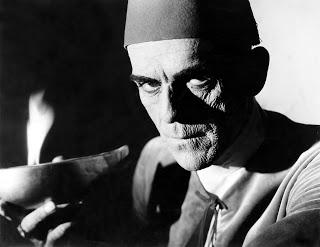 A year after playing Frankenstein, Boris Karloff brings another horror icon to life. The Mummy (1932) ranks among Universal's best horror pictures, well-acted, skillfully made and genuinely scary.
A year after playing Frankenstein, Boris Karloff brings another horror icon to life. The Mummy (1932) ranks among Universal's best horror pictures, well-acted, skillfully made and genuinely scary. A British expedition to 1920s Egypt raises mummified priest Imhotep (Boris Karloff) from the dead. A decade later, Imhotep reappears as Ardeth Bey, helping archaeologist Sir Joseph Whemple (Arthur Byron) and his son Frank (David Manners) locate the tomb of his beloved, Ank-es-en-amon. Ardeth enchants Helen Grosvenor (Zita Johann), a half-Egyptian governor's daughter distantly related to the Princess. Frank and Dr. Muller (Frank Van Sloan) try and rescue Helen before she joins Imhotep in the afterlife.
Directed by Karl Freund (Mad Love), The Mummy seems a higher-end product than earlier Universal flicks. Freund invokes the trappings of silent cinema, with long scenes playing with little sound or music, and Expressionist montage culminating in an elaborate flashback. This grants The Mummy a slow, almost languorous pace, allowing Freund to draw out tension in shadowy museums, elaborate tombs and crowded markets alike. The sight of Imhotep's bandages trailing him into the dark is more chilling than a dozen explicit murder scenes.
Freund and scenarist John L. Balderston draw from the lore surrounding Tutankhamen, whose 1922 excavators supposedly unleashed a curse on his discoverers. Deaths and madness befall Imhotep's discoverers; he wields supernatural power that can brainwash Egyptians and induce death in outsiders. Yet at heart, The Mummy's a warped love story, with Imhotep devoted to reclaiming his lost love. Helen's torn between her modern personality and the reincarnated Princess, casting a conundrum only Isis can resolve.
Boris Karloff lands another immortal performance, whether encased in bandages or his unsettling reptilian visage. Freund's close-ups make full use of Karloff's scaled makeup and piercing eyes, a disturbing force of immortal wrath. Zita Johann starts as gamely witty before degenerating into sadness, with David Manners an adequate hero. Arthur Byron and Frank Van Sloan fare well in stock roles as befuddled scientists.
Unlike Dracula or Frankenstein, The Mummy's frights stand the test of time. There are regrettable stereotypes, whether in Imhotep's mysticism or Noble Johnson's submissive Nubian, but these are forgivable faults in a 1930s film. Rather, its solid story and absorbing atmosphere make for a classic monster mash.

